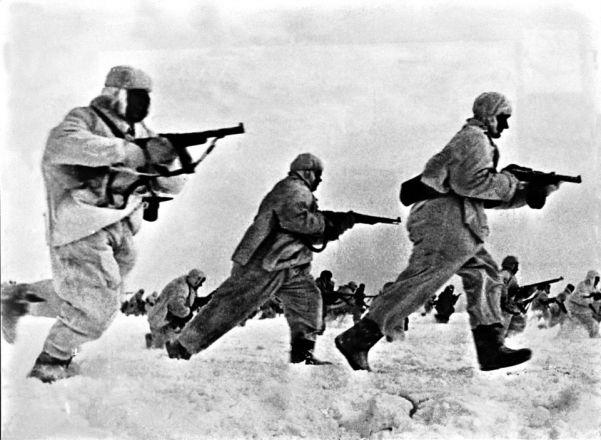6-15 October
Eastern Front, Ukraine
Germany’s Second Army and Second Panzer Army encircle three Soviet armies north and south of Bryansk on the 6th. Soviet forces begin evacuating 35,000 troops by sea from the besieged port of Odessa on the 15th.
7-20 October
Eastern Front, Soviet Union

After fierce fighting, six Soviet armies are encircled around Vyazma by the 14th. German forces elsewhere cover great distances, but the onset of heavy rains on the 8th severely limits mobility as the roads to Moscow become quagmires. Until the 20th, the Second Panzer Army also has to reduce the Bryansk pocket. The encirclements at Vyazma and Bryansk trap 673,000 troops and 1242 tanks, but also preoccupy the advancing forces, giving the Red Army time to establish new defensive positions.
16 October
Politics, Japan
General Hideki Tojo, defense minister and leader of the militarist faction within Japan, replaces the more moderate Prince Fumimaro Konoye as prime minister. Konoye’s attempts to satisfy the prowar military hierarchy and reach some form of settlement with the United States has failed. His successor exerts authoritarian control over the War and Home Affairs Ministries. This change signals the political ascendancy of the prowar faction in Japan and is a step closer to conflict with the United States and the Allies.
19 October
Eastern Front, Soviet Union
Joseph Stalin declares a state of siege in Moscow. The Soviet Union is now in the process of mounting an enormous defensive operation. Reinforcements are arriving from northern and southern regions, and a formidable series of defensive lines are now being built by Moscow’s citizens, who are also ready to fight in them. General Georgi Zhukov is to command the West Front responsible for defending Moscow.
Across the entire Eastern Front the Soviets are preparing strong defensive positions and mobilizing the entire population to support the war. Soviet resistance is fierce, and atrocities become commonplace on both sides. Agricultural and industrial resources are destroyed if they cannot be prevented from falling into German hands - a deliberate scorched earth policy.
20-25 October
Eastern Front, Soviet Union
Germany halts the original Typhoon offensive and sets more limited objectives, reflecting the deteriorating weather and strengthening Soviet resistance. The Ukraine offensive has delayed the advance on Moscow. The Germans are now racing to beat the winter weather and the mobilization of Soviet men and equipment.
24 October
Eastern Front, Ukraine
The German Sixteenth Army enters Kharkov, the Soviet Union’s fourth-largest city. Unlike the siege of Kiev, Joseph Stalin does not order a costly defense of the city. The Soviets’ ill-equipped soldiers of the Southwest Front around Kharkov escape by making a gradual withdrawal.
31 October
Sea War, Atlantic
The US destroyer Reuben James, part of an escort group accompanying a British convoy, is sunk by a U-boat, claiming 100 lives.
